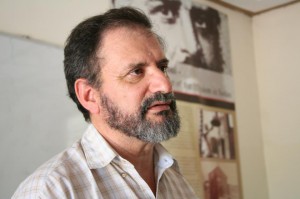
“I do not want to hide from you here that when the Holy See entrusted this vast and difficult Mission to me, my conscience was somewhat uneasy, for I was aware of my limitations with regard to this enormous mandate that God has entrusted to me through His august Vicar Pius IX. Then I realized that with our forces we will never succeed in founding Catholicism in these immense regions where the Church, despite the efforts of so many centuries, has never been successful. So I placed all my trust in the Sacred Heart of Jesus and have decided to consecrate the whole Vicariate to the Sacred Heart of Jesus on 14th September next. I have sent a circular letter for this purpose, to make it a great solemnity, and I have asked that admirable apostle of the Sacred Heart, Fr Ramière, to compose the act of solemn Consecration, which he has completed.”(Writings3318).
Dear confreres,
As the feast of the Sacred Heart approaches, I wish to share with you this brief reflection to help us prepare for this celebration, fixing our eyes on that open Heart from which our missionary vocation is born, to draw the strength we need at this point of our journey as heirs of St. Daniel Comboni.
On 31 July, 1873, St. Daniel Comboni wrote a letter to Mgr. Joseph De Girardin from which I have taken the text with which I am starting my reflection. I chose it because it seems to me to contain some elements that correspond to this moment of our life and our mission and merit some reflection on our part.
As in those days, it is not difficult to affirm that the mission entrusted to us continues to be vast and laborious; it often seems to us to be even more demanding and beyond our strength. This – and I do not delay in saying it – is of no help to living it out responsibly and effectively.
The past thirty years have seen remarkable developments in the Institute. In its process of growth, it became involved in many sectors, on many fronts and in many and varied missionary situations whose vastness is plain to see. The immense Vicariate of Central Africa has become even broader with our presence in four continents and such a variety of missionary commitments as to make us feel we are present on all the fronts of the mission. For some of us, this fact is positive and seems to fill the need of boosting one’s ego, making us think we are great missionaries because we bring the Gospel to the four corners of the planet and to all the suburbs of humanity, to use an expression dear to Pope Francis.
To its vastness we must add laboriousness, the complexity of a mission that is demanding, challenging and undergoing profound change due to the frenetic pace of change in the world and in society. The mission is changing without allowing us the time to understand how to react and the great danger seems to be the inability, on our part, to anticipate these mutations.
However, the laboriousness inherent in mission today becomes a challenge to our creativity, our ability to question and to dream so as to take new paths that make us walk in unknown and unheard-of lands – as we were told some time ago – inviting us to avoid living on what we have inherited, which may deceive us with the pretence of missionary omnipotence.
Comboni, in that letter of 1873, said he was uncertain as he knew his own nothingness. Today, we too are becoming more aware of our nothingness. Not only because the statistics show that the numbers of our personnel are decreasing. I do not think it is simply a question of numbers. I believe that this nothingness may make us understand that our forces will never be sufficient to respond to the demands of the mission and that the Lord does not think in terms of numbers.
 Where, then, should we turn our gaze and from where shall we draw strength and light to live radically our Comboni missionary vocation?
Where, then, should we turn our gaze and from where shall we draw strength and light to live radically our Comboni missionary vocation?
I think that, today, our nothingness must be measured by looking at the quality of our lives, our coherence in carrying out personal commitments and the life-options we have made, at our ability to avoid being superficial in living out our religious consecration for the mission, at our complete willingness to go and serve the poorest, at our freedom to avoid being confused by the facile suggestions of our world: consumerism, appearance, superficiality, etc.
Without reference to anyone in particular and with no desire to rebuke anyone, I think that each of us must recognise his own poverty, his own fragility and his own limits and the temptation to make of the mission something that is useful to me rather than that reality which calls me to give myself unconditionally and without using pretence to make it become a “mission made to measure”.
I have the greatest admiration for confreres who live with great enthusiasm, dedication and spirit of sacrifice in situations of unspeakable violence and danger. They are the hidden stones needed – as Comboni reminds us – to build up the mission. It is in the light of this testimony that we must measure our response to the call we have received and to discover how great, strong and capable we may be in order to embrace the mission entrusted to us today.
Comboni says in all humility: “I thought that with our forces we would never succeed”. It was not an expression of discouragement but rather the conviction that he was carrying with him a mission that does not depend on us. “Then I threw all my trust upon the Heart of Jesus”. Perhaps, or, rather, without doubt, now is the time for us to experience this abandonment and trust, of faith and openness to the plan of God in our lives, and this does not mean hiding ourselves in a spirituality that takes us out of reality or absolve us from the responsibility of being involved in building up the Kingdom.
Trust in the sacred Heart of Jesus is still, for us today, the challenge that obliges us to get our hands dirty with the transformation of our humanity by means of our missionary service, not forgetting that the only true protagonist of mission is, and always will be, the Lord.
If Comboni willed to consecrate his Vicariate to this Heart, which is nothing else than the unlimited love of God for us and all those to whom he sends us as his missionaries, I think it is worthwhile living this feast by renewing our availability so that the Lord may carry out his plan for us, recognising that the mission that is born of his Heart has a good future ahead of it. It is for this reason that we must trust that the Lord will not disappoint us.
Happy Feast day to you all.
P. Enrique Sánchez G. mccj



